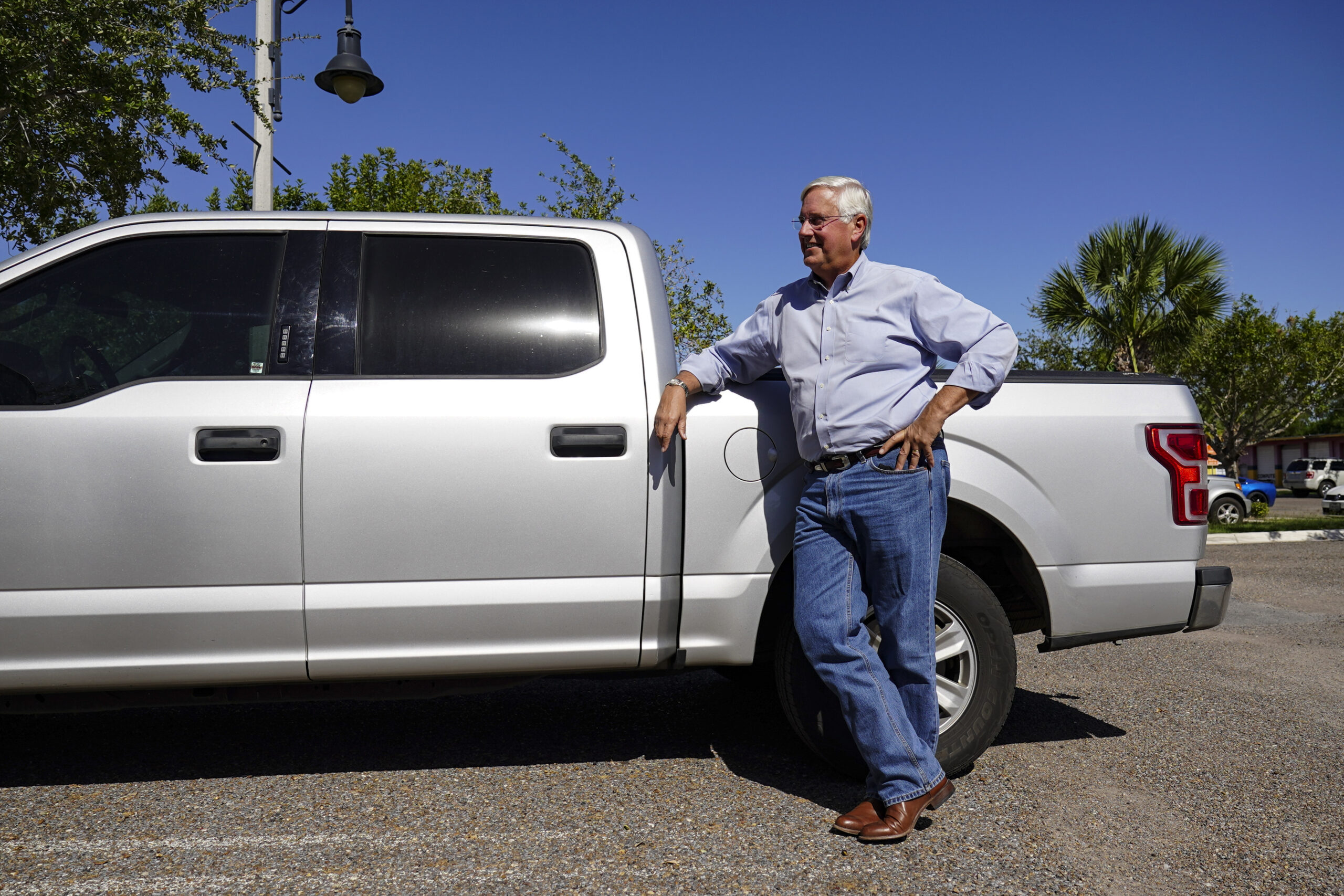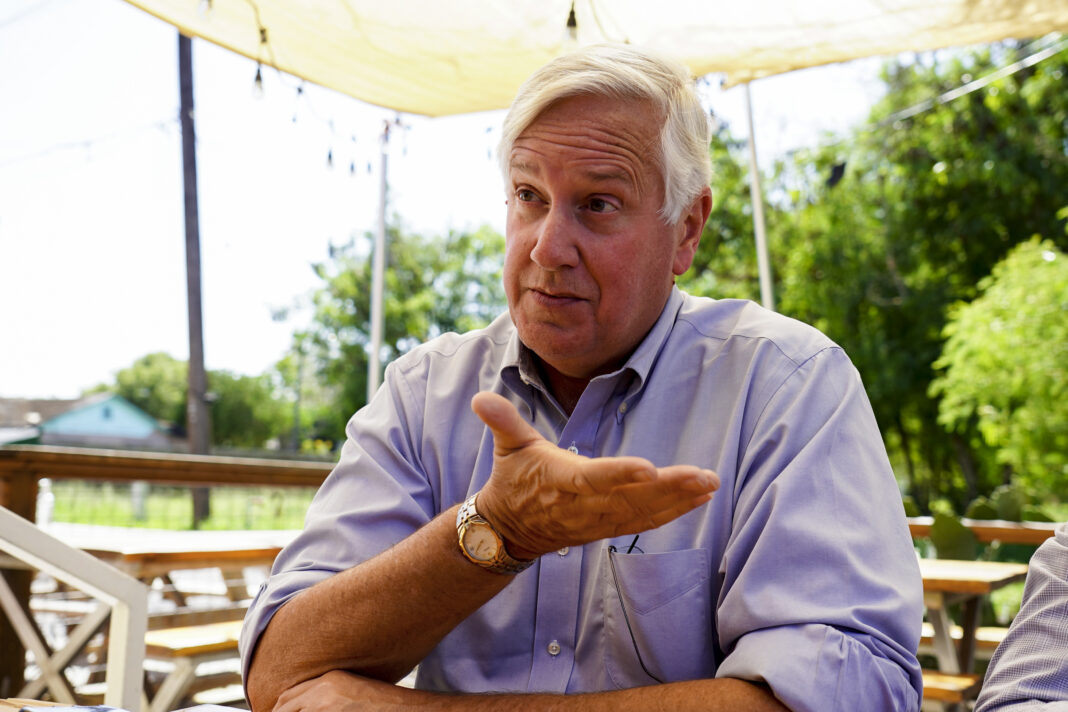In his latest swing through the Rio Grande Valley, Democratic candidate for lieutenant governor Mike Collier sat down with the Brownsville Herald to talk about why he’s gunning for two-term incumbent Dan Patrick’s seat.
It’s Collier’s second race against Patrick, who beat Collier by less than 5 percentage points in 2018. What’s changed in the interim is that the incumbent’s popularity has waned, said Collier, who has publicly vowed not to take money from corporate political action committees during the campaign or, if he wins, as lieutenant governor.
Collier said he has “12 perfectly good months” to close the gap with Patrick this time around and plans to spend it listening to voters, including voters in the Rio Grande Valley, a regular stop during his campaign. Collier was last here in April and plans to return in about a month.
“Statewide candidates can’t take any part of the state for granted,” he said. “You’ve got to come and meet people and build relationships. Voters will evaluate you on whether or not you’re going to make a difference in their lives and in their communities. The key to success in my opinion, in the Valley just like everywhere else, is you’ve got to start by talking about economic security and good-paying jobs. And there’s a lot to discuss in the Valley as it relates to good-paying jobs.”
Other key issues for the Valley include the quality of the relationship with Mexico and kitchen-table issues like access to good schools and health care, Collier said.
“We have to talk about health care,” he said. “For example we should have expanded Medicaid and a long time ago. In the Rio Grande Valley you’ve got to talk about drainage, because it floods all the time.”
After hearing voters’ concerns, it’s important to “come back with policy ideas that make sense,” Collier said, conceding that Democrats haven’t always done a good job of that in the Valley. At the same time, he said he believes Texans are weary of what he characterized as Republicans’ lack of leadership on the state level when it comes to addressing real problems Texas faces. After February’s devastating winter storm and near electrical grid failure, “fix the damn grid” has become a mantra of the Collier campaign.
“The grid is the best and most pressing example that I can think of, where Republicans in Austin are not working for us,” he said.

Collier said that despite a lot of “noise” in the Legislature about fixing the problem, nothing substantial has been done. The large corporate interests that supply and transport power in the state won’t spend the money necessary to winterize equipment and make other improvements unless there are economic incentives and/or the Legislature passes a law requiring it, he said.
“It’s not that hard to fix the grid,” Collier said. “The question is the politics of it. And we have to fix the … grid, which is why even the politics won’t be difficult. Because if I’m elected lieutenant it’ll be the first time a Democrat wins (statewide) in 30 years and it’ll change a lot of people’s thinking around politics in this state.”
Collier said he would work to achieve a fair balance between corporate interests and those of ordinary Texans, and that state laws — property tax laws for example — are currently tilted heavily toward large corporations at the expense of individual taxpayers, a situation that costs the state billions of dollars of revenue annually.
The Houston-area Democrat, a former Republican, spent 22 years as a corporate auditor with the international consulting firm PriceWaterhouseCooper, the last half in the specialized field of corporate mergers and acquisitions, when it was his job “to keep people honest,” as Collier puts it. He’s suspended that business for the campaign, and wants voters to recognize him as the candidate with the experience and “bold leadership” to push the Legislature to solve the state’s pressing problems, without corporate “paymasters” influencing his decisions.
“Where I come from, coming out of the business world, that’s what I do for a living and have for a long time,” Collier said. “Folks find that very refreshing and they tell me. A lot of folks vote for me, and folks on both sides of the aisle come out and vote for me.”
He said he hopes Beto O’Rourke runs for governor since it would be beneficial for Collier’s own campaign, as it was in 2018 when both candidates came close to unseating the incumbents — U.S. Sen. Ted Cruz, in O’Rourke’s case. O’Rourke likewise refused corporate PAC campaign donations during his campaign, and voters responded, Collier said.
“If you look at the data you’ll find that I got more votes than he did in two-thirds of the counties of the state in rural Texas,” Collier said. “He got more votes than I did in urban Texas, and he got more votes in total. What I’ve said, and he and I have discussed this, if I get his votes in the city and he gets my votes in the country, we win, and that’s very attractive I think to Democrats across the board.”





